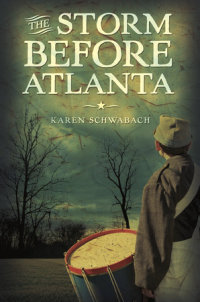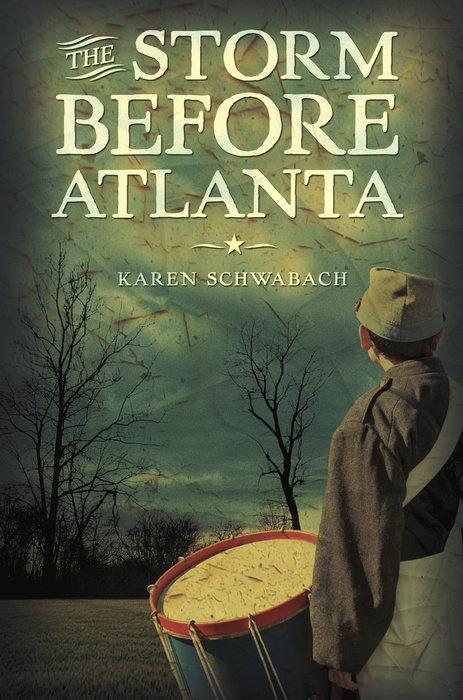Jeremy DeGroot was determined to die gloriously for his country. He knew he was meant to be a soldier. He’d known as soon as the war began.
But he was stuck being an indentured servant instead. Old Silas was supposed to feed Jeremy, clothe him, and send him to school three months a year in exchange for Jeremy’s labor. By the time Jeremy was ten he was good at making shingles, planting rye and potatoes, and managing the stubbornest oxen in all creation. But he had never had a pair of shoes, he only went to school if Silas could think of absolutely nothing else for him to do, and he got fed so little he had to hide potatoes in the woods where Silas wouldn’t look for them, just to get enough to eat.
And besides that, people in the Northwoods were always talking mean about Jeremy’s pa. It was no kind of life at all, so in 1863 Jeremy gave it up and dusted off on his own hook to Syracuse, where he…
Jeremy DeGroot was determined to die gloriously for his country. He knew he was meant to be a soldier. He’d known as soon as the war began.
But he was stuck being an indentured servant instead. Old Silas was supposed to feed Jeremy, clothe him, and send him to school three months a year in exchange for Jeremy’s labor. By the time Jeremy was ten he was good at making shingles, planting rye and potatoes, and managing the stubbornest oxen in all creation. But he had never had a pair of shoes, he only went to school if Silas could think of absolutely nothing else for him to do, and he got fed so little he had to hide potatoes in the woods where Silas wouldn’t look for them, just to get enough to eat.
And besides that, people in the Northwoods were always talking mean about Jeremy’s pa. It was no kind of life at all, so in 1863 Jeremy gave it up and dusted off on his own hook to Syracuse, where he sold newspapers. He read about the war in the papers and dreamed of how folks back home would sit up and take notice once Jeremy was a hero who’d died for his country.
Problem was, none of the blamed officers would let him join up.
“You’re too young,” said the hundredth recruiting officer Jeremy asked. Or maybe the thousandth.
“Here’s a story about a drummer boy that’s only nine,” said Jeremy, taking it out of his pocket. He’d torn it from an unsold newspaper yesterday.
“Bully for him,” the officer said, not taking the paper. He looked over Jeremy’s head at the next man in line.
There had been patriotic speeches and songs at the meeting, and a regimental band, and now the men were thronging to join up and fight against the Secessionists, those rebels who thought they could just quit the United States of America anytime they wanted.
“I know how to drum, sir,” said Jeremy. He’d found an old tin bucket with the bottom half knocked out, and he practiced on that.
“Come back when you’re eighteen,” said the recruiting officer.
“The war will probably be over by then!”
“I sure hope so.”
Jeremy didn’t.
“Move along, you’re holding up army business,” said the officer.
And at that Jeremy had to step aside and let the man behind him come forward. A grown man with a mustache--Jeremy envied him. He would find a place in the war, all right. Not Jeremy.
Jeremy stomped out of the lecture hall. It wasn’t fair. He knew he was meant to perish on the field of battle, in a blue Union uniform, and show everybody back home how it was done.
He’d already organized his own regiment among the newsboys. They practiced with a discarded drill manual he’d found on the parade grounds. They could march, file left, file right, about-face--they’d gotten so good at it that they sat on the fence by the parade grounds, their bare feet hooked around the wooden rails, watching the real recruits drill and yelling out helpful instructions to them. The recruits never seemed to appreciate this as much as they should have.
But Jeremy seemed doomed to spend the rest of his life selling newspapers on the streets of Syracuse, New York, and reading about other people’s glory.
In fact, it was time to go and pick up the evening papers.
He walked along the Erie Canal, on his way to get the Courier. A gang of canalmen was gathered beside the towpath. One of them was sitting on a barrelhead, twanging out a tune on a cigar-box mandolin, and the others sang:
On Shiloh’s dark and bloody ground
The dead and wounded lay.
Amongst them was a drummer boy
Who beat the drums that day.
A wounded soldier held him up,
His drum was by his side.
He clasped his hands, then raised his eyes
And prayed before he died.
Jeremy stopped and listened, spellbound. He imagined himself at the Battle of Shiloh. He should have been that drummer boy, his shattered drum by his side, one drumstick still held loosely in his pale hand. He imagined lying broken and bleeding in the lap of some faceless soldier, his brave young chest heaving painfully as his lifeblood pulsed out onto his uniform and covered his shiny brass buttons, which would of course have the lyre of the musicians’ corps stamped on them.
“Look down upon the battlefield,
Oh, Thou our Heavenly Friend!
Have mercy on our sinful souls!”
The soldiers cried, “Amen!”
For gathered round a little group,
Each brave man knelt and cried.
They listened to the drummer boy
Who prayed before he died.
Yes, that was how it would be--they would all gather around Jeremy, his comrades, the men whom his courage had inspired in life--they would be there to watch his brave, brave passing. Probably they would beg God to save their valiant young comrade. . . . But alas. To no avail. Tears came to Jeremy’s eyes.
“Oh, Mother,” said the dying boy,
“Look down from Heaven on me,
Receive me to thy fond embrace--
Oh, take me home to thee.
I’ve loved my country as my God;
To serve them both I’ve tried.”
He smiled, shook hands--death seized the boy
Who prayed before he died.
Jeremy’s mother, too, was in heaven (as far as he knew), and that proved that his fate was meant to be the same as the noble drummer boy of Shiloh, who had loved his country so very, very much and gladly died for it--

